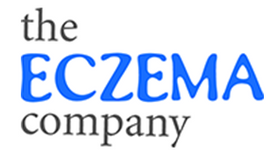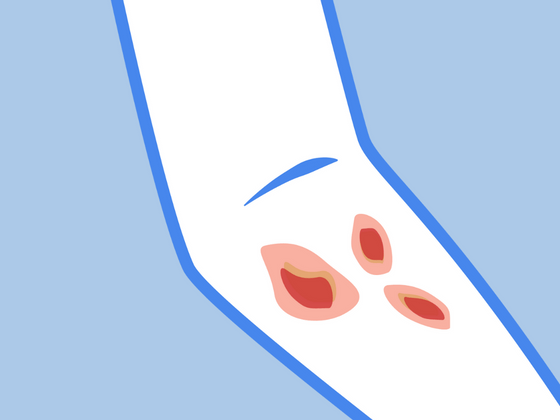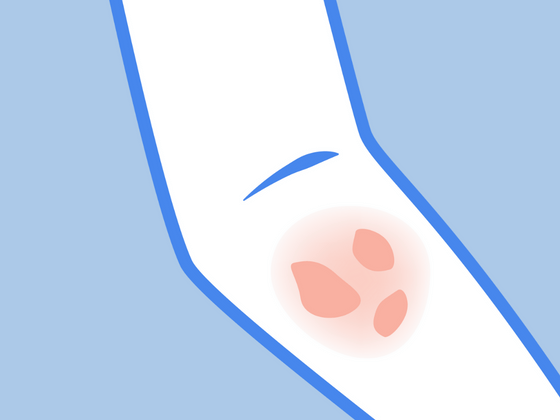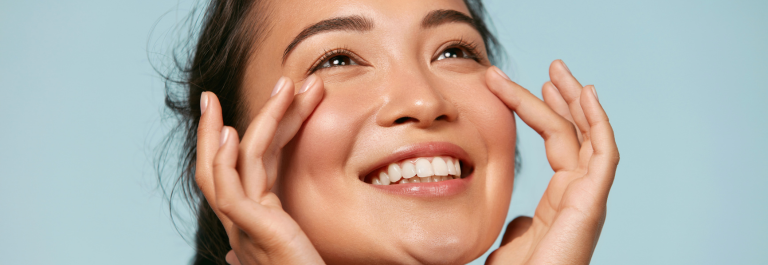Skincare can be a great form of self-care, carving out time daily to show up for yourself and invest in your well-being.
If you have eczema-prone skin, however, the ingredients in many of your favorite skin care products might make matters worse.
Throughout this blog, we're going to cover everything you need to know about:
-
The fundamental causes and symptoms of eczema
-
The worst (and best) ingredients for eczema-prone skin
-
Natural skincare solutions
Learn how re-vamping your skincare routine can help combat your eczema symptoms and unlock healthy skin.
What Causes Eczema?
Eczema refers to a set of chronic skin conditions caused by a combination of genetic and environmental factors.
One of the most common types of eczema is atopic dermatitis, characterized by dry, itchy skin patches that develop across the backs of your knees, the eye of your elbow, face, hands, and feet.
People with eczema typically have weakened skin barrier and imbalanced skin microbiome, leaving your skin hypersensitive to environmental irritants and allergens, such as many of the harsh chemicals in popular skincare products.
Living with an impaired skin barrier function also means that your skin's outer layer struggles to absorb and retain moisture, leading to severe dry skin.
Allergic and irritant contact dermatitis are two other common forms of eczema that may be triggered by skincare ingredients or ingredients within make-up.
Key Symptoms of Eczema
Sensitive skin is likely to manifest slightly differently for every person. However, if you or your loved one has eczema, there are some key symptoms to watch out for. For example, eczema flare-ups tend to be characterized by:
-
Dry, scaly skin
-
Redness and inflammation
-
Skin roughness (due to the build-up of dead skin cells)
-
Broken skin, such as cracking or bleeding
In severe cases, skin irritations may also leave you more susceptible to developing secondary infections.
Ingredients To Avoid
Skincare should be accessible for everyone, and the same goes for eczema patients.
If you experience eczema flare-ups, however, there are a few ingredients that you'll want to avoid to prevent an allergic reaction or irritated skin.
Lanolin
Lanolin is a natural moisturizer derived from sheep's wool. Despite being natural, however, studies have shown that people with eczema may experience an allergic reaction to this type of natural grease in rare circumstances. So, to be safe, we recommend you give lanolin a miss.
Fragrances
While it might be tempting to purchase those delicious vanilla-scented body washes or that soothing rose-scented face oil, be sure to check the labels first for artificial fragrances, which are notorious for aggravating sensitive skin.
Retinols
Retinols have recently created a lot of hype across the skincare market, particularly for their anti-aging and anti-acne properties.
However, this Vitamin-A derivative can trigger eczema flares, so avoid this ingredient when checking your skincare labels.
Chemical Sunscreens
Applying sunscreen daily is one of the best things you can do to promote long-term healthy skin.
If you have eczema, however, avoid chemical sunscreens, which typically include ingredients like avobenzone, oxybenzone, and octinoxate. While these ingredients protect your skin against the sun's UV rays, they can also trigger an outbreak of contact dermatitis and cause a stinging sensation.
Thankfully, there are many alternative sunscreens on the market that will be just as effective at protecting your skin against the sun's rays without flaring your eczema symptoms. For example, this Baby Badger Sunscreen SPF 30 with soothing chamomile and calendula and this Badger Sport Sunscreen SPF 35 are fantastic alternatives to chemical sunscreens.
Beneficial Ingredients for Eczema
If you have eczema, you'll know that taking care of your skin with intentionality is a crucial part of boosting your overall physical and mental health.
Whether you're eager to combat your latest eczema flare-ups or introduce more mindfulness at the end of a long day's work, plenty of skincare products work wonders for eczema-prone skin.
Shea Butter
Shea butter is a deeply moisturizing natural ingredient that seals moisture within the skin's top layer and keeps bacteria out.
Shea butter is also high in linoleic acid, a type of fatty acid found within the skin barrier that people with eczema tend to lack.
Glycerin
Glycerin is a humectant that absorbs water from the air around you, keeping your skin feeling soft, glowy, and supple.
Creams containing glycerin may also help reduce stinging or burning sensations associated with eczema symptoms.
Hydraulic Acid
Like glycerin, this popular skincare ingredient improves your skin barrier function, helping your skin absorb and retain more moisture.
Petroleum jelly
Petroleum jelly supports your skin barrier to hold and retain water, keeping your skin hydrated.
Aloe Vera Gel
Apply this to sensitive skin to help ease irritation and aid the healing of any cuts or wounds. Aloe vera is known for its antibacterial and anti-inflammatory properties.
Skincare and Your Bathing Routine
To reap the most benefits from your skincare routine, we suggest using full body and face moisturizers after getting out of the bath or shower, helping you lock in extra hydration.
While it might feel tempting to take a scorching hot shower (particularly during the winter), washing yourself with lukewarm water will be gentler for sensitive skin.
After getting out of the bath or shower, rather than scrubbing yourself dry, delicately pat your skin with a soft-fiber towel to avoid further irritation.
Natural Skincare Solutions
If you're keen to reset your skincare routine but don't know where to start, we've got some ideas for you:
For Thick, Dry Eczema
If you're coping with a flare-up of severely dry skin, we recommend trying out this Grass Fed Tallow Balm.
Tallow balm is one of the world's earliest and purest forms of skincare, and it's fantastic for eczema relief. Tallow creates a moisturizing and nourishing eczema cream comparable to coconut oil, but without worrying about allergies.
It is available in two simple formats - The unscented balm was formulated for those with the most sensitive skin conditions. The lavender balm contains lavender essential oil, a natural antibiotic and antiseptic, which promotes healing and prevents scarring.
For Itchy, Red Eczema
This Organic Manuka Skin Soothing Cream is made using organic olive oil, organic beeswax, and active 16+ New Zealand manuka honey and manuka oil extract.
Manuka honey is a natural preservative and boasts powerful antibacterial properties, helping fight the risk of secondary infections. This creamy balm is safe for your hands and face with absolutely zero added preservatives or fragrances.
For Weeping Eczema
If your eczema flares are causing weeping, broken skin that is hot to the touch, try out this Hot Skin Soother, which calms red eczema rashes, hot, tired muscles, sweat rashes, and heat rashes.
This soothing balm is made with certified safe herbs and treats topical bacteria, yeast, and fungus.
Reset Your Skin Routine Today
Follow these tips to help you find the perfect skincare routine for managing eczema symptoms today.








